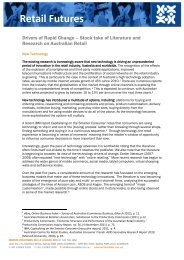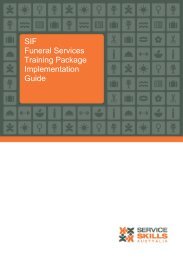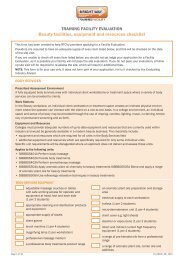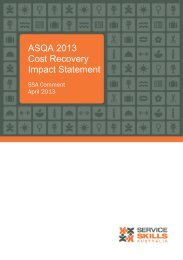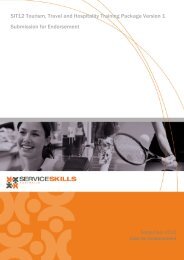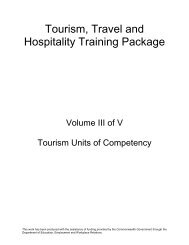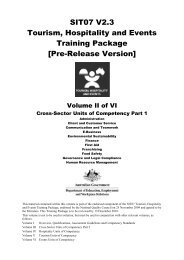Sustainability Skills Stocktake and Gap Analysis ... - Service Skills
Sustainability Skills Stocktake and Gap Analysis ... - Service Skills
Sustainability Skills Stocktake and Gap Analysis ... - Service Skills
You also want an ePaper? Increase the reach of your titles
YUMPU automatically turns print PDFs into web optimized ePapers that Google loves.
<strong>Service</strong> <strong>Skills</strong> Australia<br />
Tourism, hospitality <strong>and</strong> events<br />
<strong>Sustainability</strong> implications for the tourism, hospitality <strong>and</strong> events industries<br />
The tourism, hospitality <strong>and</strong> events industries include accommodation, restaurants, cafes,<br />
bars, catering, gaming, meetings, events (business <strong>and</strong> leisure),conferences, tour<br />
operations, tourist information services, tour guiding, holiday parks <strong>and</strong> resorts, cultural<br />
tourism, casinos <strong>and</strong> caravan park operations.<br />
While statistics are difficult to specify across these industries due to their<br />
interdependence in providing consumer products <strong>and</strong> services, it is estimated that<br />
employment is around 497,800 people in tourism <strong>and</strong> approximately 739,000 in<br />
hospitality. Business size spans from micro operations to multinational companies with<br />
the majority (more than 50%) employing between 1 – 19 people. There is a high<br />
percentage of casual <strong>and</strong> part time workers <strong>and</strong> operations are geographically spread<br />
across Australia <strong>and</strong> into remote <strong>and</strong> regional communities.<br />
These industries depend on providing customers with an appealing <strong>and</strong> worthwhile<br />
experience, often drawing on the features <strong>and</strong> offerings of local cultures <strong>and</strong> the<br />
environment. Because of this dependence, these industries need to be especially careful<br />
to maintain <strong>and</strong> conserve these attractions in order to ensure their ongoing sustainability.<br />
For many years this has been a central underst<strong>and</strong>ing of most operators <strong>and</strong> as such,<br />
concepts of sustainability are built into business plans <strong>and</strong> training programs.<br />
However, with the increased pressures on reducing carbon footprints stemming from<br />
consumer dem<strong>and</strong>, increasing regulation <strong>and</strong> sustainability drivers, the focus on<br />
sustainability has increased the need for further development in skills <strong>and</strong> operational<br />
leadership.<br />
Sustainable tourism activities aim to have minimal impact on the environment <strong>and</strong> have<br />
resulted in a range of new eco-tourism products <strong>and</strong> services. Issues of sustainability in<br />
tourism include contributing to the management, conservation <strong>and</strong> improvement of<br />
cultural <strong>and</strong> environmental heritage, protection of biodiversity, respect <strong>and</strong><br />
underst<strong>and</strong>ing for other cultures, their values <strong>and</strong> practices, economic benefit to <strong>and</strong><br />
control <strong>and</strong> involvement of local communities, <strong>and</strong> educational value of tourism. Tourism<br />
plays an important role in the protection of Australia‟s natural environment.<br />
The hospitality industry shares many of these concerns, <strong>and</strong> also has an especially strong<br />
focus on waste minimisation. Food waste in restaurants, water <strong>and</strong> power use in hotel<br />
linen processing <strong>and</strong> showering, energy use in air conditioners <strong>and</strong> lighting, packaging<br />
<strong>and</strong> disposal are all key targets for improving environmental outcomes. Many<br />
restaurateurs are sourcing organic <strong>and</strong> or locally produced produce as part of their<br />
sustainability initiatives. Hospitality customers often hold expectation of being treated<br />
<strong>and</strong> pampered rather than dealing with constraint <strong>and</strong> conservation. <strong>Sustainability</strong><br />
initiatives in this industry will therefore require engaging the support <strong>and</strong> cooperation of<br />
customers. <strong>Sustainability</strong> will need to be achieved without an increase in price or a drop<br />
in quality.<br />
Across the tourism, hospitality <strong>and</strong> events industries, the sustainability of facilities is<br />
another key area. Designs which incorporate the use of environmentally friendly<br />
technologies such as natural lighting, grey water systems, compost toilets, solar power,<br />
elevated walkways, environmentally friendly building materials, insulation, recycling <strong>and</strong><br />
composting, are increasingly being implemented to reduce environmental impact. These<br />
are especially noticeable in remote areas <strong>and</strong> in natural environments. Transport to <strong>and</strong><br />
26



